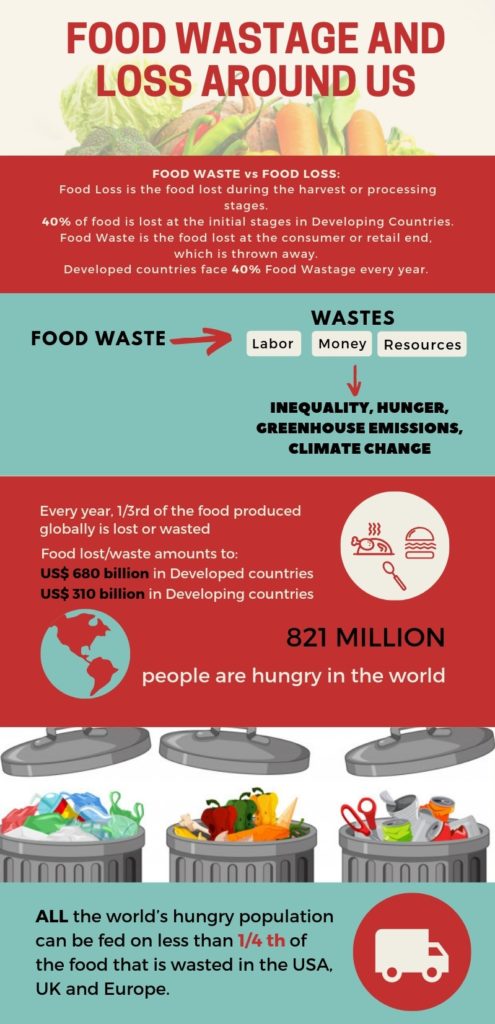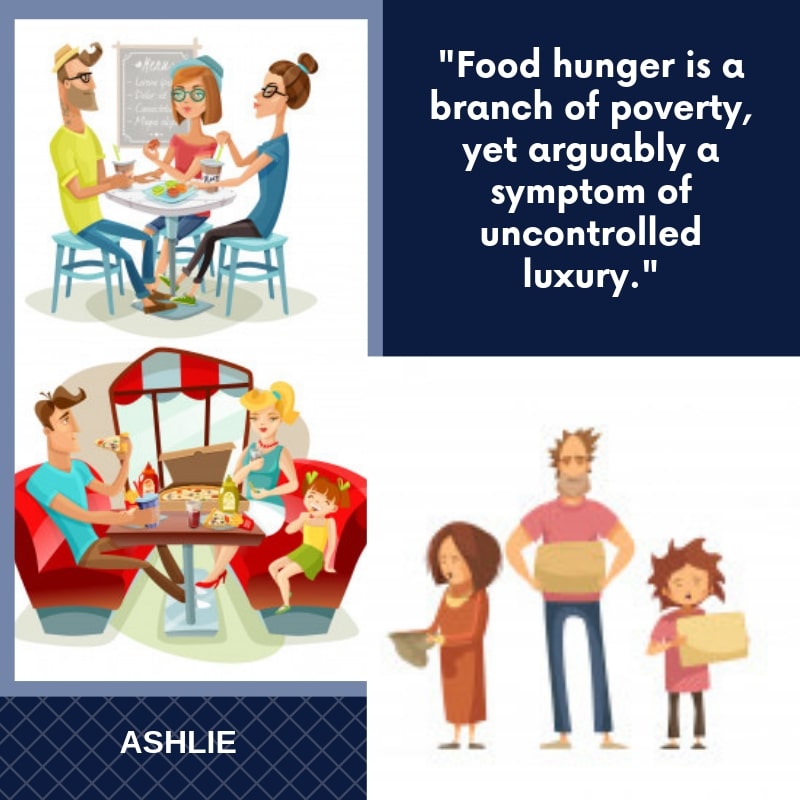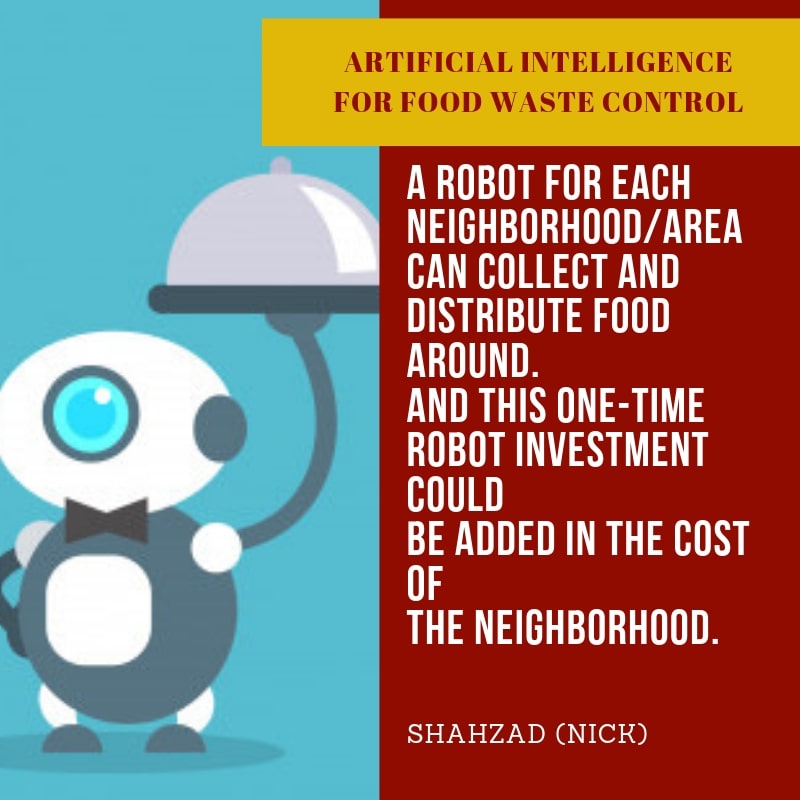Our IdeasUnlimited team has a tradition of sharing something positive and something thought-worthy every Friday before we all leave for a relaxing weekend. This gives us a chance to discuss our thoughts and bounce ideas off each other about giving back to the society in any way that we can. Coming from all over the world, the IdeasUnlimited’s team brings in knowledge of ground-level realities and a varied experience and input on every topic that is under the limelight each Friday.
This is in spirit with the IdeasUnlimited ambition of mutual growth and becoming conscientious world citizens.
A few Fridays back, our CEO Shahzad Yaqoob (Nick) initiated a discussion on food wastage across the continents. It got us all thinking about how we experience food waste as individuals and how can we counter it.

Food wastage is a complex and multidimensional issue. It impacts human existence through nutritional and environmental degradation.
Research shows the increasingly dismal situation of food availability, usage, distribution and access disparity amongst the developed and developing countries of the world over the years.
The stark differences in economic development are also reflected in the prevalent levels of food poverty and food waste reduction efforts among nations. The nature of food insecurity, hunger, food waste and food loss varies across the globe. Thankfully, there are many international and local initiatives that have prioritized food waste eradication as their main goals.
For a succinct and holistic report on Food Wastage and Loss Around the World prepared by IdeasUnlimited, please
However, food wastage largely remains a societal issue which needs attention from all segments of the society. It is important to bring this narrative under discussion and share techniques for combatting this growing menace at households, organizational, and national levels.

One of our colleagues at IdeasUnlimited, Ashlie, has shared that she feels very strongly about food waste at the household level. Food wastage for her is eatables thrown away because of thoughtlessness, which is in effect food that did not reach the deserving families who are starving. Ashlie aptly calls food hunger as “a branch of poverty, yet arguably a symptom of uncontrolled luxury”. She practices portion control for adults in her household and only cooks a healthy version of the food her young son likes to eat, in order to avoid throwing away cooked and uncooked food. She suggests the creation of food drop-off points in every locality to utilize food that is not being used in homes.
This way instead of throwing it in bins, we can forward it to our fellow citizens who are facing food shortage.
On the same lines, Shakira advocates and practices controlled grocery shopping. This involves buying grocery only when needed and in quantities that can be utilized before the food goes bad in the kitchen. She is also a strong proponent of repurposing leftover cooked ingredients into snacks or supplementing them with another small dish for another meal. This not only reduces the burden of cooking but ensures that food never finds its way to the bin. Better yet, she packages up any leftovers and gives them to the less privileged around her.
Shahzad thinks developed nations should play a major role in eradicating this global issue, as these countries are more proficient in terms of technology and resources. As the developed world has a much more significant proportion of food waste around the world, they should be looking into making permanent and universally applicable laws for reducing portion sizes at restaurants and establishing food pick-up points after lunch and dinner hours to help the needy populace receive food parcels (with due regard to hygiene and health issues) which would otherwise be thrown away as wasted food items.
Shahzad postulates the usage of robotics and artificial intelligence to set up a permanent facility in every neighborhood for transferring food from those who do not need it to those who are looking for it. Not only would this assist in sorting any food parcels from households, restaurants, and supermarkets, it can match it with those who need it. This one-time investment can be fruitful in expanding the radius of collection and delivery of such food.
Moreover, a website or app can be set up that is updated at the backend in real time with available food packages and the contents of each.

Those seeking assistance in getting access to safe and healthy food can sign up for this service and get notifications on availability of the same. The Artificial Intelligence (AI) behind it can match the food packages to those in need closest to that location. The possibilities are endless!
He also believes that more investment should be made towards advocacy campaigns to educate households about efficiently utilizing food products and forwarding them to the less privileged in case of any excess.
I believe the major reason for food waste in today’s world is uncontrolled and growing consumerism. I see how we over-buy at giant food suppliers and hypermarkets because of cheaper prices and promotional offers on bundle purchases. I often find myself becoming a victim of these marketing gimmicks. An international law on food wastage and recycling for Hypermarkets should be implemented to monitor and control food wastage practices.
However, moving from a developing country to developed country, I have noticed how the number of needy people and the nature of food waste changes. Back home in Pakistan, it is very easy to find someone to whom you can give your excess cooked or uncooked food. It is very common at my parents’ house to pack all leftovers and distribute them to the poor people they find on roads on their way. Moreover, there are numerous local food points locally called ‘lunger’ where anyone can drop off cooked as well as uncooked food or even money, to be used by the administration there to feed hungry people. This is done as a form of charity.
Whereas in many developed nations like UAE, government takes full responsibility of its people and their wellbeing. One cannot find hungry or needy people and children asking for food on the roads or pavements. Here, it is very important that you shop and cook wisely to avoid filling your bins instead of nourishing other humans in need. Having said that, to feed people there are government established food or charity centers where you can help in preparing and serving food and provide raw food that can be cooked and distributed amongst the needy.
We always have a choice of being proactive and resolving a growing crisis or contributing to it. Together as a team at IdeasUnlimited, we have become more resolute to reduce food wastage in and around our spaces—resolving the problem at our own micro level. As a result of this discussion, we have come to realize the exponential and multilayered effects of food waste and loss around the world.
Hence, we have decided to become a strict advocate of food sharing and managed grocery shopping to perform our part of helping this world become more equivalent in terms of food distribution. As, indeed, if we do not practically become a part of solutions for Food Wastage and Hunger, we will certainly remain a part of the problem.









